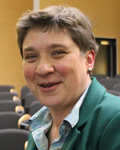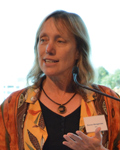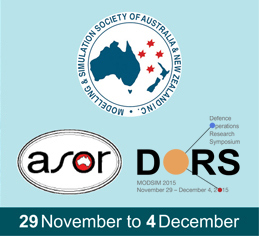Partnering with industry and the community for innovation and impact through modelling
Plenary Speakers
Associate Professor Mary Myerscough
University of Sydney, Australia
Why do hives die? Using models to explore the mechanism of honey bee colony collapse.
 Mary Myerscough received her first degrees in Applied Mathematics from the University of Sydney and then completed her D.Phil (the equivalent of a PhD) in mathematical biology at Oxford University.
Mary Myerscough received her first degrees in Applied Mathematics from the University of Sydney and then completed her D.Phil (the equivalent of a PhD) in mathematical biology at Oxford University.
She returned to Sydney to take up a research position in the School of Chemistry at Macquarie University where she studied the mathematics of exothermic chemical reaction kinetics. She became interested in honey bees when her boss dropped a paper on her desk which suggested that a stationary honey bee swarm was very similar to a smouldering lump of coal and its temperature could be modelled in a similar way.
Since then, Mary has been working on problems in honey bee and termite behaviour in collaboration with biological scientists at Sydney University, Macquarie University and CSIRO. She has also works with biomedical scientists at the University of Sydney on models for cancer and vascular disease.
Mary is an Associate Professor in the School of Mathematics and Statistics at the University of Sydney.
Professor Kerrie Mengersen
Queensland University of Technology, Australia
You Say, I Hear: Case studies of academic-industry engagement
 Kerrie Mengersen is a statistician whose research interests are in Bayesian and other modern methods for statistical modelling and computation. She currently holds a Chair in Statistics at Queensland University of Technology, Australia, with previous appointments at Siromath Pty Ltd, Bond University, Central Queensland University, Colorado State University and the University of Newcastle. Kerrie has maintained an active collaborative and consultancy profile in both the development of statistical methods and in their application to a wide variety of problems in environment, health and industry. She is a Deputy Director of the ARC Centre of Excellence in Maths and Stats Frontiers, which aims for research excellence and its translation to collaborative domains in healthy people, sustainable environments and prosperous societies. For the past decade Kerrie has led the Bayesian Research and Applications Group (BRAG) which aims to engage in world-class, relevant fundamental and collaborative statistical research, training and application through Bayesian and other modern methods.
Kerrie Mengersen is a statistician whose research interests are in Bayesian and other modern methods for statistical modelling and computation. She currently holds a Chair in Statistics at Queensland University of Technology, Australia, with previous appointments at Siromath Pty Ltd, Bond University, Central Queensland University, Colorado State University and the University of Newcastle. Kerrie has maintained an active collaborative and consultancy profile in both the development of statistical methods and in their application to a wide variety of problems in environment, health and industry. She is a Deputy Director of the ARC Centre of Excellence in Maths and Stats Frontiers, which aims for research excellence and its translation to collaborative domains in healthy people, sustainable environments and prosperous societies. For the past decade Kerrie has led the Bayesian Research and Applications Group (BRAG) which aims to engage in world-class, relevant fundamental and collaborative statistical research, training and application through Bayesian and other modern methods.
Dr Rob Vertessy FTSE
Bureau of Meteorology, Australia
How modelling propels environmental intelligence at the Bureau of Meteorology
 Dr Rob Vertessy is the Director of Meteorology and CEO of the Bureau of Meteorology – a position he has held since September 2012. Prior to this appointment he was head of the Bureau’s Climate and Water Division which included responsibility for the National Climate Centre, the national flood forecasting and warning service, and the agency’s new water information function.
Dr Rob Vertessy is the Director of Meteorology and CEO of the Bureau of Meteorology – a position he has held since September 2012. Prior to this appointment he was head of the Bureau’s Climate and Water Division which included responsibility for the National Climate Centre, the national flood forecasting and warning service, and the agency’s new water information function.
Rob has a PhD in fluvial geomorphology from the Australian National University and spent the first 20 years of his career as a researcher in CSIRO specialising in catchment hydrology. During this time Rob served as Chief Executive of the CRC for Catchment Hydrology (2002–2004) and Chief of CSIRO Land and Water (2004–2007).
In late 2006, Rob was seconded to the Department of Prime Minister and Cabinet to advise on the establishment of a national water information strategy. He later joined the Bureau of Meteorology to lead implementation of a new national water information function awarded to that agency.
Rob is Australia’s Permanent Representative to the World Meteorological Organization. In 2013 he was elected a Fellow of the Australian Academy of Technological Sciences and Engineering.
Dr Christina Burt
University of Melbourne, Australia (Mid-career plenary speaker)
Hybrid approaches for challenging scheduling problems in open pit mining
 Christina Burt completed her PhD in Operations Research at Curtin University of Technology in 2008 with a Chancellor's commendation. Since then, she has collaborated on several industry research projects in Perth (Curtin University), Melbourne (University of Melbourne) and Vienna (Austrian Institute of Technology), including projects with industry partners Rio Tinto Iron Ore, Strabag, Hubaer and SatNetCom. Christina specialises in modelling and mathematical programming solution methods for transportation and scheduling problems.
Christina Burt completed her PhD in Operations Research at Curtin University of Technology in 2008 with a Chancellor's commendation. Since then, she has collaborated on several industry research projects in Perth (Curtin University), Melbourne (University of Melbourne) and Vienna (Austrian Institute of Technology), including projects with industry partners Rio Tinto Iron Ore, Strabag, Hubaer and SatNetCom. Christina specialises in modelling and mathematical programming solution methods for transportation and scheduling problems.
Professor Howard Wheater
The University of Saskatchewan, Canada
Modelling hydrological extremes in a data sparse environment – experience from Western Canada
 Howard Wheater holds the position of Canada Excellence Research Chair in Water Security and Director, Global Institute for Water Security at University of Saskatchewan, Canada, and Distinguished Research Fellow and Emeritus Professor of Hydrology at Imperial College London, UK. He is Fellow of the Royal Academy of Engineering, UK, and of the American Geophysical Union. His various national and international prizes include the Prince Sultan bin Abdulaziz International Prize for Water. He has a distinguished research record in hydrological processes and modelling and has advised various governments and international agencies on issues of flood, water resource and water quality management. He has represented Hungary and Argentina at the International Court of Justice, and recently was a member of a Court of Arbitration in a dispute between Pakistan and India concerning the Indus Waters Treaty.
Howard Wheater holds the position of Canada Excellence Research Chair in Water Security and Director, Global Institute for Water Security at University of Saskatchewan, Canada, and Distinguished Research Fellow and Emeritus Professor of Hydrology at Imperial College London, UK. He is Fellow of the Royal Academy of Engineering, UK, and of the American Geophysical Union. His various national and international prizes include the Prince Sultan bin Abdulaziz International Prize for Water. He has a distinguished research record in hydrological processes and modelling and has advised various governments and international agencies on issues of flood, water resource and water quality management. He has represented Hungary and Argentina at the International Court of Justice, and recently was a member of a Court of Arbitration in a dispute between Pakistan and India concerning the Indus Waters Treaty.
Associate Professor Jason Evans
University of New South Wales, Australia (Mid-career plenary speaker)
High-resolution climate change projections over Australia: producing policy-relevant information
 Jason Evans is an Associate Professor and ARC Future Fellow in the Climate Change Research Centre at the University of New South Wales. He received his PhD in hydrology and regional climate science from the Australian National University before spending several years as a research scientist at Yale University in the USA. He is the co-Chair of the Global Energy and Water Exchanges (GEWEX) projects Hydroclimate Panel, and a coordinator of the Coordinated Regional Climate Downscaling Experiment (CORDEX) AustralAsia domain. Both are projects of the World Climate Research Programme (WCRP).
Jason Evans is an Associate Professor and ARC Future Fellow in the Climate Change Research Centre at the University of New South Wales. He received his PhD in hydrology and regional climate science from the Australian National University before spending several years as a research scientist at Yale University in the USA. He is the co-Chair of the Global Energy and Water Exchanges (GEWEX) projects Hydroclimate Panel, and a coordinator of the Coordinated Regional Climate Downscaling Experiment (CORDEX) AustralAsia domain. Both are projects of the World Climate Research Programme (WCRP).
Jason’s research is aimed at understanding regional climate processes and regional climate changes. He works on problems concerning land-atmosphere coupling and water cycle processes over land. His focus is at the regional (or watershed) scale and includes processes covering river flow, evaporation/transpiration, water vapour transport and precipitation. The main tools of his research are models including regional climate models, land surface and hydrology models.


